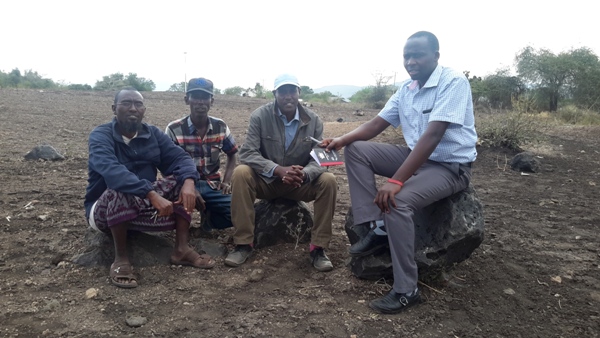Kambi Garba, Isiolo
Today we had a privilege to visit Kambi Garba Muslim cemetery near Isiolo town. We paid a courtesy call to the oldest grave in the county. It is a grave site for one Muslim Cleric called Sheikh Said Mohammed who died during the second world war.

On the gravestone, it is indicated in Arabic that the religious leader died in the year 1360 of the Islamic calendar. This was around 1935 in the normal calendar years.
“This village has been in existing for the last 80 years.” Ibrahim Shabo
“This grave has a writing on it showing that the religious cleric died over 80 years ago,” addded Shabo.
The Constitution of Kenya is very clear. It states that a graveyard is public land and all public land is used for public interest.
“Sisi hatukatai project, hatukatai maendeleo. We ask to be involved in the development planning so that we can show the government where the project should pass” said the village elder from Kambi Garba.
It was very clear that the people of Isiolo like many people around the world have an emotional attachment to the land where their ancestors were buried.
Inadequate Public Participation
The residents of Isiolo feel that they are not adequately involved in the design and planning of LAPSSET corridor projects.
Which is the route for LAPSSET corridor?
The majority of Isiolo residents are unable to tell the exact route of the LAPSSET corridor projects. This situation leaves them guessing. There is need for the stakeholders to sensitize the people on the routes and effects of the project.
Major Actors
The Land Laws (Amendment) Act clearly states who is responsible for issuing eviction notices in state development projects. Here is an extract from the legislation:
Section 152 C of Land Laws (Amendment) Act 2016:
The National Land Commission shall cause a decision relating to an eviction from public land to be notified to all affected persons, in writing, by notice in the Gazette and in one newspaper with nationwide circulation and by radio announcement, in a local language, where appropriate at least three months before the eviction.
The above extract clearly shows who is responsible for deciding an eviction. The National Land Commission. The period given before an eviction starts is three months. This is adequate time for project affected people to find alternative settlement.


